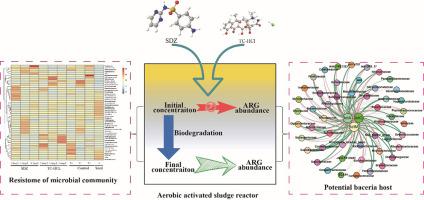Journal of Water Process Engineering ( IF 6.3 ) Pub Date : 2023-01-26 , DOI: 10.1016/j.jwpe.2023.103499 Hameer Chand , Yu-Xiang Lu , You Wu , Ayaz Thebo , Jing Nan , Yu-Li Yang , Hai-Liang Song

|
A high antibiotic concentration promotes the horizontal gene transfer (HGT) of antibiotic resistance genes (ARGs) in the wastewater while reducing the ARG abundance due to the production of resistance. However, the two-way effects of antibiotic concentration on the abundance of ARGs with different antibiotics are still lacking. Herein, the fate of ARGs and the corresponding composition of the microbial community (i.e., resistome and potential host bacteria for HGT) were investigated by adding two typical antibiotics (i.e., sulfadiazine, SDZ, and tetracycline hydrochloride, TC-HCl) under different concentrations. Results indicated that the initial antibiotic concentration for two antibiotics had different effects on the abundance of the corresponding ARGs (i.e., tet or sul); however, it was affected by the final antibiotic concentration, and a higher final antibiotic concentration would have a higher ARG abundance for both two antibiotic treatments. A higher initial antibiotic concentration would decrease the abundance but improve the diversity of the microbial community, resulting in the different biodegradation abilities of the corresponding antibiotic and subsequently affecting the resistome of microbial community, resulting in altering the abundance of ARGs (i.e., tet or sul). On the other hand, a higher final antibiotic concentration had a higher abundance of potential host bacteria, resulting in a higher abundance of ARGs (i.e., tet or sul). This study provides new insights into the mechanisms underlying the alteration of ARG abundance to the selection pressures of antibiotic concentration in aerobic activated sludge reactors.
中文翻译:

好氧活性污泥反应器中微生物群落和抗生素抗性基因对抗生素浓度选择压力的破译
高抗生素浓度促进了废水中抗生素抗性基因 (ARG) 的水平基因转移 (HGT),同时由于抗性的产生而降低了 ARG 的丰度。然而,抗生素浓度对不同抗生素的 ARGs 丰度的双向影响仍然缺乏。在此,通过在不同浓度下添加两种典型抗生素(即磺胺嘧啶、SDZ 和盐酸四环素、TC-HCl),研究了 ARGs 的命运和微生物群落的相应组成(即 HGT 的耐药组和潜在宿主细菌) . 结果表明,两种抗生素的初始抗生素浓度对相应 ARGs(即tet或sul); 然而,它受最终抗生素浓度的影响,并且较高的最终抗生素浓度将对两种抗生素治疗具有较高的ARG丰度。较高的初始抗生素浓度会降低丰度,但会提高微生物群落的多样性,导致相应抗生素的生物降解能力不同,进而影响微生物群落的耐药性,从而改变 ARGs(即tet或sul )的丰度). 另一方面,较高的最终抗生素浓度具有较高丰度的潜在宿主细菌,导致较高丰度的 ARG(即tet或sul). 本研究为好氧活性污泥反应器中 ARG 丰度改变对抗生素浓度选择压力的潜在机制提供了新的见解。















































 京公网安备 11010802027423号
京公网安备 11010802027423号